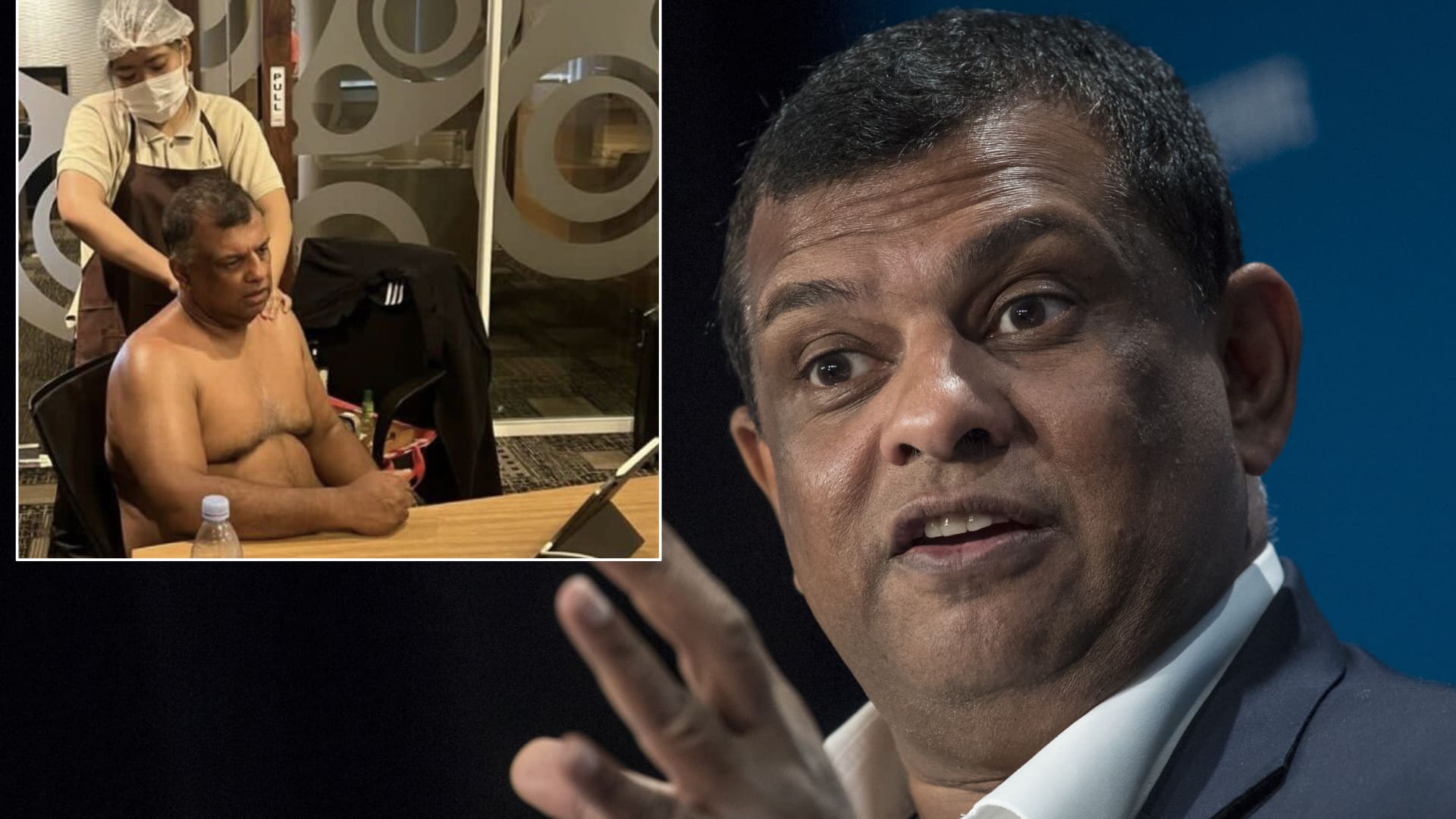Products You May Like
AirAsia founder and CEO Tony Fernandes says he does not regret the viral LinkedIn post that showed him receiving a massage during a meeting — and that transparency is worth potential controversy.
The Malaysian businessman is known for an unfiltered approach to posting on social media. He does not get his posts vetted by his PR team and wants to keep it that way, he told CNBC in a wide-ranging interview last month.
“I am transparent, and social media allows me to be very transparent. It has a disadvantage, that people will misrepresent and misunderstand Tony Fernandes the persona,” he said.
Recent widely-shared posts have seen Fernandes jokily tell off a passenger for bringing food onto a flight, against the budget airline’s policy. He also generated some skepticism after stating that he had been forced to fly with rival Singapore Airlines because AirAsia flights were full.
But by far the strongest reaction to a social media post by Fernandes came in October, when the businessman shared a photograph of himself shirtless in the office.
“Got to love Indonesia and AirAsia culture that I can have a massage and do a management meeting,” the post read, prompting a slew of comments and media coverage.
Fernandes told CNBC: “My famous topless sports massage was all about showing our culture, to be honest, that we had such a flexible culture. Of course, I got permission from everyone in the room to say, are you okay?”
“Initially I asked whether we could delay the meeting so that I could have a massage, I was in a lot of pain from a lot of flying. But the team said, we’re okay, you know, nothing to hide. We’d rather not delay it. So I was actually posting to say, what an amazing culture we have.”
However, the message got twisted and prompted a backlash, he said. Despite this, he insisted: “Do I regret it? No. Got me a lot of publicity.”
While some of the online comments poked fun at the post, others made more serious objections, calling it inappropriate and observing that staff may have felt uncomfortable and unable to challenge their boss.
“Appropriate is whatever people around you deem appropriate, right? I could have had a meeting on the beach with Richard Branson and my management staff, and everyone would have said, how cool is that?” Fernandes said.
“You can’t have a more diverse airline such as ours, our top management is mostly women … we have such a flat, fun, transparent, direct culture,” he added.
‘Best time in aviation’
AirAsia’s oft-repeated origin story is that Fernandes and partners bought the airline — which was then just two aircraft and millions of Malaysian ringgit in debt — from the Malaysian government in 2001, for less than one U.S. dollar.
It has since expanded to a fleet of more than 200 aircraft with a focus on low-cost flights across the ten-nation ASEAN group and connections to the wider region. It currently operates under two companies, Capital A-owned Air Asia and the medium-haul Air Asia X.
The process is underway, subject to approvals, to merge the two firms into one group. A restructuring aimed at lifting Capital A out of financially distressed status is also being pursued, and last month the company finalized a deal that will see its brand licensing unit list on the Nasdaq stock exchange.
Fernandes told CNBC that pandemic struggles had necessitated a plan for “surviving,” which included setting up logistics, engineering and digital divisions. However, he now sees positive longer-term consequences for both AirAsia and the aviation industry as a result of the turmoil, noting that both airlines have been reporting record profits.
“I think we [now] have the best time in aviation,” he said.
“If you think about history of aviation, America went through lots of ups and downs and a lot of consolidation … Europe went through the same thing, there were a lot of state-owned carriers which threw a lot of valuations out by crazy pricing, or state subsidies,” Fernandes added.
“ASEAN was in that position with a lot of state-owned airlines being subsidized and throwing fares and being irresponsible. Covid has taught everyone a lesson. So that is one positive for me, in that we now have a rational market.”
He said fares had risen by 30% and weren’t coming down anytime soon, with airline capacity unlikely to change over the next five to six years. This is in part due to a backlog in aircraft orders that manufacturers are struggling to keep up with.
“We have an advantage of a 400 plane order book, but many airlines don’t have that … If you buy a plane now you won’t get one till 2031,” he said.
Fernandes said AirAsia had been “lucky” as an Airbus-only customer to swerve the ongoing turbulence at Boeing with its 737 Max aircraft, though he added that he believed the U.S. planemaker would “come out of [it] stronger.”
Travel trends
Fernandes said he sees some resurgence in demand from China, but just as good, if not better, opportunities in the Indian market. Post-pandemic, Asian travelers are showing a preference for regional journeys and even domestic ones — partly because of the current “jingoistic” climate, he said.
He is, meanwhile, excited by the potential for new long-range aircraft, particularly Airbus’s A321 XLR, its long-range, single-aisle plane.
“That’s going to enable us to create a long-range, medium-haul low-cost carrier that can span 10 hours … So it means that dream of having a narrow-body to take you around the world, as opposed to a wide-body which is much more expensive,” Fernandes said.
“That would be a very exciting concept, creating an Emirates or a Qatar, but on narrow-body.”
